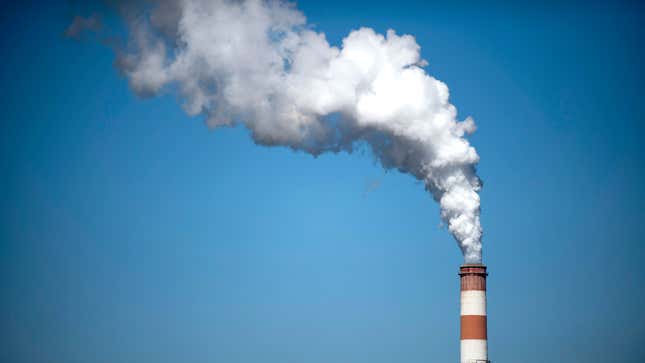
All eyes are on the current coronavirus outbreak becoming the next pandemic, but scientists are ringing the alarm on an ongoing pandemic that already exists: Air pollution.
In a paper published Monday night in the journal Cardiovascular Research, the team of European researchers highlights the number of deaths air pollution causes each year. Almost 8.8 million people die a year due to this diminished air quality, which can cause heart disease, lung cancer, and lower respiratory infections.
To put things in perspective, the scientists authoring the paper compared these deaths to health crises that receive more attention. Tobacco smoking kills some 7.2 million people a year, per the World Health Organization (WHO). In 2018, HIV killed 770,000 people, WHO reports. Vector-borne illnesses, such as malaria and dengue, are responsible for some 700,000 deaths annually. While all illnesses should be a reason for alarm, air pollution doesn’t get the type of attention that all these other public health crises do despite killing more people a year.
“Comparing the loss of life expectancy from air pollution with many other risk factors gave rise to some surprises,” paper author Jos Lelieveld, director of the Atmospheric Chemistry Department at Germany’s Max Planck Institute, wrote in an email to Earther. “We had not expected that air pollution mortality is so dominant compared to other, more accepted health risk factors, including smoking.”
This is why the authors are calling air pollution a pandemic.
The authors used an atmospheric model to calculate worldwide exposure to particulate matter and ozone pollution. They then fed that data into a new global mortality model to measure the impact air pollution is having on loss of life expectancy and disease-specific premature mortality. The team was even able to distinguish the impact different types of pollution have. The research found that, unsurprisingly, the leading source of air pollution is fossil fuels.
Hm, fitting given that the evil fossil fuel industry is also responsible for the climate crisis.
Power plants, cars, and energy use aren’t just spewing greenhouse gases into the air and warming the planet. They also burp out a bunch of toxic junk—such as particulate matter and ozone, but also other dangerous metals like lead—that harms people’s bodies. Telling people to abandon their cars or carbon-heavy meals, however, might prove trickier than convincing those addicted to cigarettes to quit smoking. Many of us, after all, depend on our cars and need to keep the lights on in our homes.
“It’s harder to point the finger at ourselves,” Aaron Bernstein, director of Harvard T.H. Chan School of Public Health’s Center for Climate, Health, and the Global Environment, told Eather. (He didn’t work on the study.) “HIV and malaria are enormously problematic, but no one is benefiting from those diseases. We are benefiting from fossil fuels, and so to say they’re a problem is challenging because we’re so enmeshed in them. We’re so dependent on them, and yet they’re killing us.”
Fossil fuel companies are benefiting the most, though. The rest of us are forced to rely on fossil fuels for our cars and homes because—let’s face it—who can yet afford an electric car these days? And electric vehicles aren’t even that great for the planet if you’re plugging them into a grid that still relies on fracked gas or oil. And clean energy? While renewable energy generation is increasing, this isn’t happening fast enough for consumers to abandon fossil fuels in time to meet greenhouse gas reduction goals. And it’s certainly not happening fast enough to protect public health.
What will change this failing system is political will.
“We know how to do renewable energy. We know how to electrify vehicles. We know how to make communities more walkable ,” he said. “To get the political will to do that, I think we need to make clear that people’s health—that everyone’s health—can be made better when we make these choices, and that happens right now when you stop burning fossil fuels.”
The study shows just how much of a health risk air pollution is. We already know that air pollution has been linked to brain problems, depression, and violence. Now, we’re getting all that put into perspective. There are limitations to this research (as there is with any study). The science still needs to more closely examine the levels of toxicity among air particles, which may influence the numbers. And there are always uncertainties when analyzing health data, which may be miscategorized. That risk, however, is no more than it would be for data related to other health problems (like smoking).
To make matters worse, these findings may be on the conservative side, said Bernstein. That’s because the study doesn’t even focus on the impacts on children or fetuses. Nor does it look at the mortality inflicted by other toxic compounds that result from air pollution, such as mercury or lead. If such a study were to account for the health impacts from fossil fuels at large, which includes climate change, the numbers would be even more startling.
“Fossil fuels,” Bernstein told Earther, “would make tobacco look like an infinitesimally small problem.”